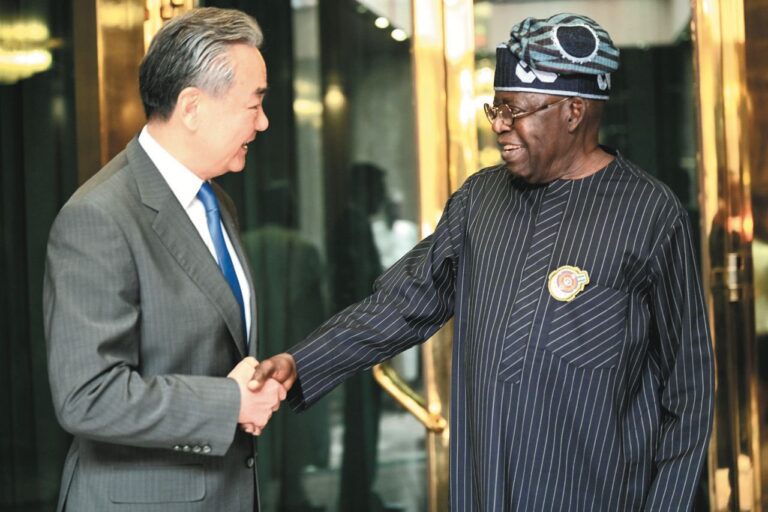President Bola Tinubu has projected that Nigeria could become a net exporter to China within the next five years, following Beijing’s landmark decision to eliminate tariffs on imports from 53 African nations—including Nigeria.
The zero-tariff policy, which grants African exporters duty-free access to the Chinese market for a wide range of products—including agricultural goods, cosmetics, and personal care items—was implemented last week and is expected to reshape bilateral trade dynamics.
Speaking at the Nigeria-China Sustainable Business, Bilateral Trade and Investment Summit in Lagos, Tinubu, represented by Joseph Tegbe, Director-General of the Nigeria-China Strategic Partnership, emphasized the potential of this policy to serve as a springboard for Nigeria’s economic resurgence.
Strategic Sectors and Investment Opportunities
President Tinubu identified ten strategic pillars of China-Africa cooperation that Nigeria can leverage, especially in sectors such as agriculture, manufacturing, digital trade, and green energy. He outlined a suite of Chinese investment commitments in Nigeria, including:
-
$1 billion in integrated agricultural initiatives
-
$800 million for a cassava value chain programme
-
$1 billion in electric vehicle battery production and mineral development
-
$1.2 billion in automotive manufacturing
-
$10 billion in proposed investments in Nigeria’s oil and gas sector
“These developments present an unprecedented opportunity for Nigeria to reindustrialize and expand its export base,” Tinubu noted.
Legislative Backing for Bilateral Growth
The President called on Nigeria’s National Assembly to pass enabling legislation to maximize gains from the new tariff-free framework, urging reforms in areas such as:
-
Trade facilitation and customs modernization
-
Harmonization of tariffs
-
Land-use and property laws
-
Agro-technology transfer
-
Renewable energy policies
-
Digital economy legislation and special economic zones
“China must not be on the fringes of Nigeria’s investment agenda—it must be at the center. The executive can propose, but the legislature must support with enabling laws,” Tinubu said, highlighting the critical role of Parliament in unlocking bilateral capital flows, streamlining regulations, and encouraging technology transfer.
Infrastructure and Industrial Ambitions
Tinubu spotlighted Nigeria’s growing role in China’s Belt and Road Initiative, particularly with strategic assets such as the Lekki Deep Seaport, which serves as a crucial logistics hub for West Africa.
He emphasized that Nigeria’s transport corridors, ports, and special economic zones are positioned to become continental trade gateways, aligning with broader infrastructure goals under the Belt and Road framework.
A Shared Future in Trade and Innovation
Speaker of the House of Representatives, Tajudeen Abbas, represented by Minority Leader Kingsley Chinda, pledged legislative backing for Nigeria-China economic ties, announcing plans for a comprehensive trade facilitation bill aligned with global best practices.
“The House will continue to champion policies that ensure Nigeria becomes a key player in global commerce, especially with China,” Abbas stated.
Foreign Affairs Minister Yusuf Tuggar, represented by senior official Bolaji Akinremi, echoed the need for reciprocity clauses in trade agreements to ensure fairness and reduce existing trade imbalances. Tuggar emphasized the importance of positioning Nigeria—and ECOWAS—as a unified and competitive trading bloc.
China Ready to Import ‘Made-in-Nigeria’ Products
China’s Ambassador to Nigeria, Mr. Yu Dunhai, affirmed Beijing’s readiness to boost imports from Nigeria, saying:
“We want to see more Nigerian products in the Chinese market. This partnership is about mutual growth and prosperity.”
A Vision Anchored on Sustainable and Inclusive Growth
In closing, President Tinubu reaffirmed that Nigeria’s engagement with China must be rooted in mutual respect, shared opportunities, and long-term sustainability. Key areas of collaboration include:
-
Public health investment and hospital development
-
Clean energy and climate resilience
-
Joint security training and peacekeeping
-
Entrepreneurship, innovation hubs, and EV manufacturing
“Our ambition to build a $1 trillion economy relies on strategic partnerships like this one,” Tinubu said, calling on all stakeholders to drive forward the bilateral agenda with bold vision and aligned action.

